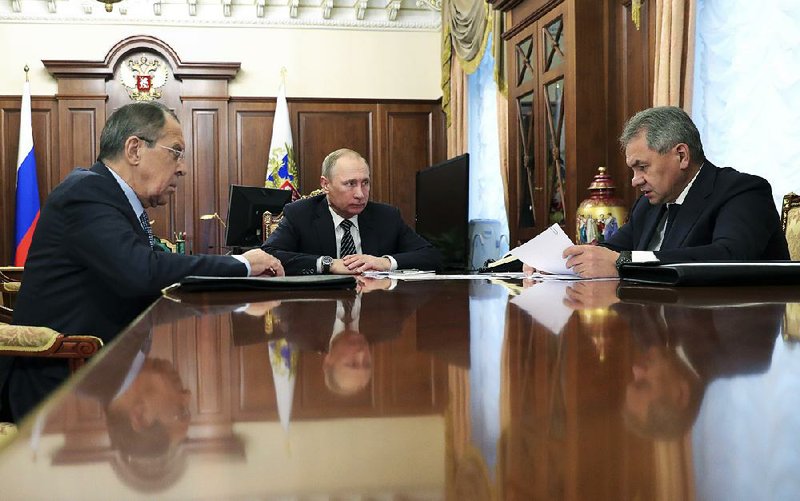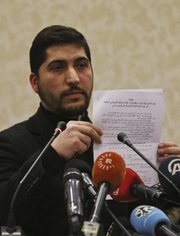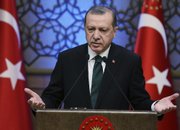BEIRUT -- Russia and Turkey announced a cease-fire agreement in Syria that they hope will pave the way to a peace settlement ending the nation's civil war, seizing the initiative from the U.S. after years of failed diplomacy.
The cease-fire went into effect at 4 p.m. Central time after six years of fighting that has left more than a quarter-million people dead and triggered a migrant and refugee crisis across Europe.
If the agreement holds, the truce between the Syrian government and the country's mainstream rebel forces will be followed by peace talks next month in Astana, the capital of Kazakhstan, Russian President Vladimir Putin said in announcing the agreement. He described the truce, however, as "quite fragile" and requiring "special attention and patience."
Turkish President Recep Tayyip Erdogan -- speaking from Ankara, the Turkish capital -- called the agreement a "historic opportunity" that should not be squandered. Iran and the United Nations also welcomed the truce.
[TIMELINE: Key events in Aleppo since the start of Syria’s uprising ]
Russia said the deal was signed by seven of Syria's major rebel factions, with ranks numbering 62,000, and excludes extremists such as the Islamic State group and Jabhat Fatah al-Sham, the militant group formerly known as the Nusra Front. The truce is expected to at least reduce the violence that has gripped the country, including government airstrikes.
Opposition activist Mazen al-Shami told The Associated Press that half an hour before the truce began, the situation became "very calm" in the suburbs of the capital, Damascus.
He added that a government offensive on the rebel-held Barada Valley northwest of Damascus that had been going on for days had stopped.
Several previous cease-fires all collapsed, some of them in a matter of days. Nevertheless, the deal raised hopes for a political settlement in the coming months, in part because the tide has turned in Syrian President Bashar Assad's favor militarily over the past year, with the government retaking the city of Aleppo from the rebels just days ago. Turkey, which is fighting Kurdish and Islamic militants at home, appears more willing to strike a bargain with Russia if it means protecting its borders.
Putin said the cease-fire will be guaranteed by Russia -- Assad's chief patron and battlefield ally -- and by Turkey. Turkey is a main backer of the opposition forces, which use the country's long border with Syria to cross back and forth, and has wide influence on them. Iran has been one of Assad's strongest supporters.
Syrian Foreign Minister Walid al-Moallem welcomed the cease-fire agreement and said there is a "real chance" for a political settlement. Assad's future has been the main sticking point in previous negotiations between the warring sides.
In comments made to Syrian TV, al-Moallem said the Syrian government will attend the peace talks in Astana "with an open mind," but suggested that it would not be willing to compromise on Assad's fate.
"Everything is negotiable except national sovereignty and the people's right to choose its leadership," he said.
Saeed Sadek, a professor of political sociology at Cairo's Future University, said Assad has the full backing of Russia and Iran -- and no power to accept or reject any deals.
"He is now under the control of Moscow, Tehran and Ankara," Sadek said. "All these countries will decide his future."
Reaction in U.S.
The White House, which has resisted greater involvement in what it sees as a largely intractable conflict, welcomed the news of the truce.
"Any effort that stops the violence, saves lives and creates the conditions for renewed and productive political negotiations would be welcome," said the State Department's deputy spokesman, Mark Toner, reiterating the department's view that "there is no military solution to this nearly six-year crisis."
Sen. Lindsey Graham, R-S.C., took a sharper tone, writing on Twitter, "I fear what is being hailed as a cease-fire in Syria will become a capitulation to Russia and Iran."
If the agreement holds, it could solidify Assad's grip on the country's western ridge and lead to a joint effort by Russia and the United States against Islamic State militants. But that is a big if, given the number of parties involved, their competing interests and the scope of the fighting.
Joshua Landis, director of the Center for Middle East Studies at the University of Oklahoma, was one of many skeptical observers.
"The truce will not last because most militias have not signed on to it, but it is important because Turkey is putting the militias on notice that its border will be closing to them and that the world will turn its backs on the military effort to make Assad step aside," he said.
"This points toward the 'political' solution that Assad and the Russians have been demanding, which is that the world must stop supporting the insurgency," he added. "The regime will negotiate amnesty with militias it can deal with and will kill or chase out of Syria all those who refuse to sue for peace or whom it considers unredeemable or jihadists."
Of the seven rebel groups that signed the deal, five have gotten U.S. military aid. Ahmad al-Saoud, a spokesman for a CIA-backed rebel group that is included in the agreement, said in a phone interview that meetings about the cease-fire were continuing in Ankara.
The U.S.-backed Free Syrian Army will abide by the truce, according to an emailed statement from the National Coalition for Syrian Revolutionary and Opposition Forces. Nasr al-Hariri, a coalition spokesman, said his group signed the agreement and that all opposition forces are committed to the truce. He told Al Jazeera TV that he "hoped this will pave the way for a new political phase" despite "very bad experiences" with previous cease-fire agreements.
Russian Defense Minister Sergei Shoigu said the Russian military has established a hotline with its Turkish counterpart to monitor compliance. Sergey Lavrov, Russia's foreign minister, said Egypt, Saudi Arabia, Qatar, Iraq, and Jordan will be invited to endorse the agreement soon, and President-elect Donald Trump's administration will be welcome to join the peace process once he takes office.
Assad has called Trump "a natural ally" in the fight against terrorism.
The U.N. special envoy for Syria, Staffan de Mistura, welcomed the cease-fire announcement, saying he hopes the agreement will save civilian lives, facilitate the delivery of humanitarian aid and pave the way for productive peace talks.
Earlier Thursday, Turkey called on Hezbollah to withdraw its fighters from Syria. The Iranian-backed extremist group has sent thousands of fighters to support Assad and has been playing an instrumental role in the civil war since 2013.
Foreign fighters from around the world have joined both sides of the Syrian conflict, which has displaced half the country's population and produced more than 4 million refugees. Many of those refugees have been streaming into Europe, fueling anti-immigration sentiment and terrorist fears that are reshaping the continent's political landscape.
Syria's military noted that the cease-fire comes after the "successes achieved by the armed forces," an apparent reference to the fierce fighting in Aleppo.
Putin said he ordered the Russian military to scale back its presence in Syria, where it has provided crucial support to Assad's forces. Putin didn't say how many troops and weapons will be withdrawn. He said Russia will continue "fighting international terrorism in Syria" and supporting Assad's military.
Putin said once before, in March, that the bulk of Russian forces would go home, yet combat continued. The main thrust of the Russian effort is built around its air force, but the military also deployed some ground troops and special forces.
"I agree with the Defense Ministry proposal to scale back our military presence in Syria," Putin said. "We will certainly continue our fight against international terrorism, of course, and will continue to support the legitimate Syrian government in its fight against terrorism."
Information for this article was contributed by Bassem Mroue, Vladimir Isachenkov, Suzan Fraser, Najib Jobain and Zeina Karam of The Associated Press; by Ben Hubbard and Neil MacFarquhar of The New York Times; by Stepan Kravchenko, Henry Meyer, Taylan Bilgic, Dana Khraiche and Zaid Sabah of Bloomberg News; and by Louisa Loveluck and Andrew Roth and Heba Habib of The Washington Post.
A Section on 12/30/2016


